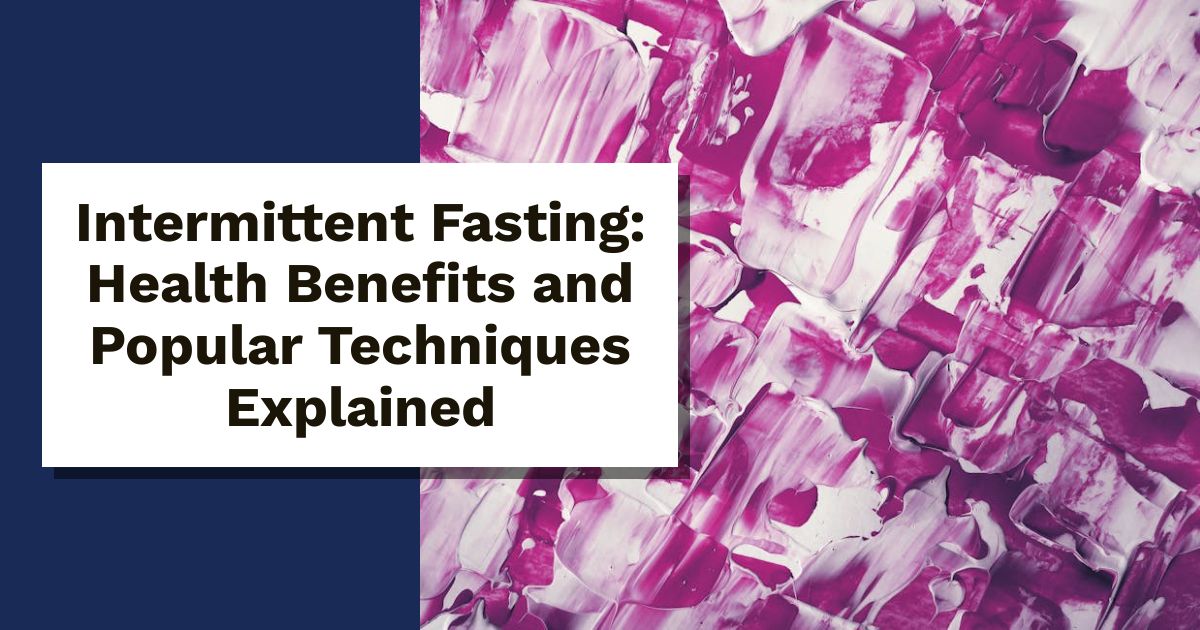Intermittent fasting has taken the wellness world by storm. But what’s the hype all about? Simply put, it’s a popular method for managing health through timed eating patterns.
Many people are turning to this approach to boost their energy levels, manage weight, and improve their overall well-being. It’s not just about skipping meals; it’s about when you eat and how you can harness that timing to feel your best.
In this post, you’ll discover the benefits of intermittent fasting and explore various techniques to help you jumpstart your journey. Whether you’re a seasoned biohacker or just curious, there’s something here for everyone. Ready to unlock your potential? Let’s dive in!
What is Intermittent Fasting?
Intermittent fasting (IF) is more than just skipping meals. It’s a structured eating pattern that alternates between periods of eating and fasting. The appeal lies in its simplicity and potential health benefits, which is why many biohackers are jumping on this trendy bandwagon.
The Basics of Intermittent Fasting
So, what does intermittent fasting actually entail? Here are the key components:
- Fasting Windows: During a fasting window, you refrain from eating for a set period. This can range from 16 hours a day with an 8-hour eating window (16/8 method) to full-day fasts.
- Eating Windows: This is your time to enjoy food! You can consume meals during this interval but should still focus on nutritious options.
- Flexibility: You can choose a method that suits your lifestyle. Whether it’s the 5:2 method (eat normally for five days and restrict calories for two) or the Warrior Diet (fast for 20 hours and eat one large meal at night), there’s something for everyone.
Popular Methods of Intermittent Fasting
When it comes to intermittent fasting, several methods are gaining traction:
- 16/8 Method: Fast for 16 hours and eat your meals within an 8-hour window. This method is popular due to its simplicity and ease of integration into daily life.
- 5:2 Diet: Eat normally for five days and limit calorie intake to about 500-600 calories for two days of the week. This method allows for flexibility while still reaping fasting benefits.
- Eat-Stop-Eat: In this method, you fast for a full 24 hours once or twice a week. This can be tougher but may yield significant benefits when done correctly.
- Alternate-Day Fasting: Fast every other day. This method can be more challenging but may provide impressive results.
The Benefits of Intermittent Fasting
Intermittent fasting isn’t just a weight loss strategy. Many people experience additional health perks, such as:
- Weight Management: By restricting eating times, many find it easier to reduce calorie intake without feeling deprived.
- Improved Focus: Fasting can lead to better concentration and mental clarity. It’s like giving your brain a refreshing break from food distractions!
- Cellular Repair: Time spent fasting can initiate autophagy, a process where your body cleans out damaged cells. Think of it as a mini spring cleaning for your insides.
- Possible Longevity: Some animal studies suggest that intermittent fasting may lead to longer life spans by reducing disease risk.
In essence, intermittent fasting is about more than just when you eat; it’s about optimizing your health in a way that fits your life. Interested in learning more? Check out these resources for more detailed insights: Johns Hopkins Medicine, Mayo Clinic, and Healthline.
Ready to explore how to implement this into your routine? There’s a world of health benefits waiting just beyond your next meal!
Health Benefits of Intermittent Fasting
Intermittent fasting isn’t just a trend; it’s a powerful tool for improving overall health. Many people are diving into fasting for various reasons, from weight loss to enhanced brain function. Let’s explore the different health benefits this eating pattern can potentially offer.
Weight Loss and Fat Loss
Intermittent fasting can be a game changer for weight management. By restricting your eating windows, it’s often easier to consume fewer calories. When you fast, your insulin levels drop, which helps burn stored fat for energy. Think of it this way: you’re urging your body to tap into its fat stores rather than relying on a constant influx of food. According to research, those who try intermittent fasting tend to lose more weight compared to those who don’t. Healthline outlines how this method can effectively aid in shedding pounds while promoting healthier eating habits.
Improved Metabolic Health
Fasting doesn’t just aid in losing weight; it also works wonders on your metabolic health. By improving insulin sensitivity, it helps regulate blood sugar levels. This can lead to lower blood sugar levels, reducing the risk of type 2 diabetes. Some studies indicate that intermittent fasting can significantly enhance metabolic markers. When your body spends time without food, it’s forced to switch energy sources, which can help improve overall energy metabolism. For more detailed insights, check out studies from NCBI.
Cellular Repair Processes
One of the more fascinating benefits of intermittent fasting is its role in autophagy, your body’s way of cleaning out damaged cells. During fasting, your body initiates autophagy to eliminate waste and recycle components. This process is crucial for maintaining healthy cells and reducing the risk of diseases, including cancer. Think of autophagy as a spring cleaning for your cells—it clears out the junk to make room for fresh energy. For those interested in how this works, refer to sources like Cleveland Clinic.
Enhanced Brain Function
Fasting doesn’t just nourish your body; it might also enhance your brain health. Studies suggest that intermittent fasting can increase levels of brain-derived neurotrophic factor (BDNF), a protein that supports brain function and cognitive abilities. This can lead to better memory, focus, and learning capabilities. Plus, by reducing inflammation and oxidative stress, fasting can protect the brain against age-related decline. For further reading, explore the insights from BSW Health.
Potential Longevity Benefits
The benefits of intermittent fasting may extend beyond immediate health improvements. Some research has linked fasting to increased lifespan. Animal studies indicate that intermittent fasting may lead to a reduction in age-related diseases, showing promising results in longevity. Though more human studies are needed, the potential to improve your health span is an exciting prospect. For more information, see the findings on Salk Institute.
Exploring these benefits reveals that intermittent fasting could be an effective approach for many health goals. Whether you want to manage your weight, boost brain function, or improve overall health, fasting offers engaging possibilities.
Popular Intermittent Fasting Techniques
Intermittent fasting provides several methods to cater to different lifestyles and preferences. Understanding these popular techniques can help you identify which might suit you best. Here’s a closer look at each method:
The 16/8 Method
The 16/8 method is straightforward. You fast for 16 hours and eat within an 8-hour window. For many, this involves skipping breakfast and eating from noon to 8 PM. During fasting, only non-caloric beverages like water, coffee, or tea are allowed. This method is popular because it fits well into most daily routines. It’s like setting your own dining hours!
If you want to learn more about this method, check out this resource: 16/8 Intermittent Fasting: Benefits, How-To, and Tips.
The 5:2 Diet
The 5:2 diet allows for regular eating for five days while restricting calories to 500-600 on two non-consecutive days. On fasting days, you might consume a small meal or two, making it easier to manage hunger pangs. This flexibility makes it popular among casual dieters. People appreciate that they can enjoy their favorite meals most of the week without feeling deprived.
Interested in trying the 5:2 diet? Discover more here: The Beginner’s Guide to the 5:2 Diet.
Alternate Day Fasting
Alternate Day Fasting (ADF) involves fasting every other day. On fasting days, you might eat nothing or limit your intake to a small meal. This method can seem challenging but might yield significant results. People often find a rhythm, alternating feast and famine days. It’s like having a weekend of ‘normal’ eating followed by a day of rejuvenation.
Curious about ADF? Learn more here: Alternate-Day Fasting: A Comprehensive Beginner’s Guide.
Eat-Stop-Eat
With the Eat-Stop-Eat technique, you fast for a full 24 hours once or twice a week. For example, if you eat dinner at 7 PM, you wouldn’t eat again until 7 PM the next day. It can be tough at first, but many find it liberating. Your body adapts, and you’ll likely find it easier with practice. It’s a way to hit the reset button on your eating habits.
Want to know more about Eat-Stop-Eat? Check this out: Eat Stop Eat Review: Does It Work for Weight Loss?.
Warrior Diet
The Warrior Diet is a more extreme form of intermittent fasting. It involves 20 hours of minimal food intake followed by a large meal during a 4-hour eating window at night. Inspired by ancient warriors, the idea is to fuel up at night and fast during the day. This method can promote weight loss and improve energy levels. It’s like preparing for battle—intense fasting followed by a hearty feast.
Intrigued by the Warrior Diet? Explore more here: The Warrior Diet: Review and Beginner’s Guide.
Each of these methods has its unique flavor and benefits. Choosing the right one for you can be a fun journey as you discover how your body responds to fasting!
Tips for Success in Intermittent Fasting
Starting intermittent fasting can feel overwhelming, but with some effective strategies, you’ll find success. These tips can make your journey smoother and more enjoyable.
Start Slow
If you’re new to intermittent fasting, ease into it. Jumping straight into long fasting periods may shock your system. Consider starting with short windows, like the 12/12 method, where you fast for 12 hours and eat during a 12-hour interval. Gradually increasing your fasting hours can help your body adjust without overwhelming you. What feels right today might change tomorrow. Find your balance!
Stay Hydrated
Hydration is crucial during fasting. You might think skipping meals means skimping on water, but that’s not the case! Drinking plenty of water keeps your energy levels up and helps reduce hunger pangs. You can also enjoy herbal teas and black coffee—both are calorie-free and can help curb cravings. Make it a goal to sip throughout the day. Staying hydrated is a fundamental key to success!
Listen to Your Body
Your body knows best. Pay attention to how it feels during fasting. Are you genuinely hungry, or is it just a habit? Learn to recognize real hunger cues. It’s okay to break your fast early if you’re feeling unwell. The goal is to find a routine that works for you, not to punish yourself. Listen to what your body is telling you, and adjust accordingly.
Plan Your Meals
Meal prepping is your friend! When you plan your meals ahead of time, it’s easier to make healthy choices. Fill your plate with nutritious options, focusing on lean proteins, healthy fats, and plenty of fruits and veggies. This foresight helps you resist the temptation of unhealthy snacks. Consider your eating windows as organized feast times—how do you want to fill your plate?
Join a Community
Finding support can boost your success in intermittent fasting. Look for communities online through forums or social media groups where people share tips and experiences. Connecting with others who are on the same journey keeps you motivated. It’s also a great place to find new recipes and strategies. After all, who wouldn’t want a cheering squad as they embark on this adventure?
For more in-depth insights on intermittent fasting, check out these useful resources: Intermittent Fasting 101 — The Ultimate Beginner’s Guide and 6 Intermittent Fasting Tips To Help You Succeed.
Conclusion
Intermittent fasting offers a wide array of health benefits. From weight loss to improved brain function, this approach can be a helpful tool in your wellness journey. It encourages mindful eating while promoting bodily repair and energy boosts.
Consider exploring the different techniques to find what resonates with you. Each method has the potential to fit into your lifestyle while enhancing your overall well-being.
Are you ready to transform your eating habits? Share your experiences and thoughts on intermittent fasting! Let’s continue the conversation about optimizing our health together.
Brooke is a rock-climbing 🧗♀️, tennis-playing 🎾, biohacking 🧬 bookworm 📚 on a mission to unlock the secrets of health, longevity, and living life to the fullest 🌟. When she’s not scaling cliffs, hitting the courts, or testing out the latest hacks, you’ll find her nose in a book or adventuring with her four-legged best friend 🐕 by her side. With a knack for turning science into simple, actionable tips, Brooke’s writing is your guide to hacking your biology and living your best, most vibrant life!


